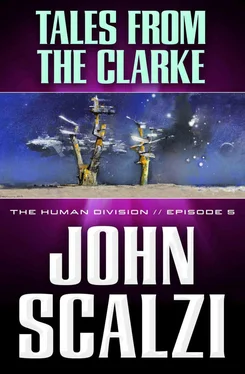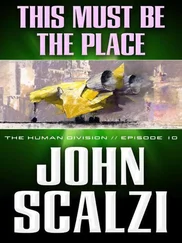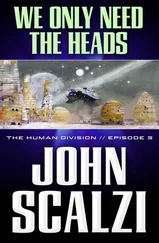John Scalzi - Tales From the Clarke
Здесь есть возможность читать онлайн «John Scalzi - Tales From the Clarke» весь текст электронной книги совершенно бесплатно (целиком полную версию без сокращений). В некоторых случаях можно слушать аудио, скачать через торрент в формате fb2 и присутствует краткое содержание. Жанр: Фантастика и фэнтези, на английском языке. Описание произведения, (предисловие) а так же отзывы посетителей доступны на портале библиотеки ЛибКат.
- Название:Tales From the Clarke
- Автор:
- Жанр:
- Год:неизвестен
- ISBN:нет данных
- Рейтинг книги:3 / 5. Голосов: 1
-
Избранное:Добавить в избранное
- Отзывы:
-
Ваша оценка:
- 60
- 1
- 2
- 3
- 4
- 5
Tales From the Clarke: краткое содержание, описание и аннотация
Предлагаем к чтению аннотацию, описание, краткое содержание или предисловие (зависит от того, что написал сам автор книги «Tales From the Clarke»). Если вы не нашли необходимую информацию о книге — напишите в комментариях, мы постараемся отыскать её.
Tales From the Clarke — читать онлайн бесплатно полную книгу (весь текст) целиком
Ниже представлен текст книги, разбитый по страницам. Система сохранения места последней прочитанной страницы, позволяет с удобством читать онлайн бесплатно книгу «Tales From the Clarke», без необходимости каждый раз заново искать на чём Вы остановились. Поставьте закладку, и сможете в любой момент перейти на страницу, на которой закончили чтение.
Интервал:
Закладка:
“Thank you,” Wilson said. “If you want me, I’m happy to serve in this role for you. I’m just surprised you want me. I was pretty sure I was on your shit list, Captain.”
“You were,” Coloma said. “You are. But help me with this and you’ll get off of it.”
“Yes, ma’am,” Wilson said.
“Good. Then we’re done here,” Coloma said. “You’re dismissed.”
“Of course,” Wilson said, and then saluted Coloma again.
“I already told you that wasn’t necessary,” Coloma said to Wilson.
“You put your ship in the path of a missile meant to kill members of an alien race, and kept the Colonial Union from having to fight a fight we’d have lost,” Wilson said. “That deserves a salute, ma’am.”
Coloma returned the salute. Wilson left.
Basquez got his conduits a day before departure and was not in the least happy about it. “We’ve barely got time to install them, much less test them,” Basquez said, through the PDA. “And I haven’t had time to update the engineering systems down here. We’re still working off of fifty-year-old stations. You need to ask your Rigney for a delay.”
“I already did and he already said no,” Coloma said. She was in the shuttle bay’s control room with Balla and Wilson, waiting for the arrival of the Earth diplomats. “They’ve got these people on a tight schedule.”
“His precious schedule will be disrupted if we blow the hell up,” Basquez said.
“Is that really going to be a problem?” Coloma said.
There was a pause on the other end of the PDA. “No,” Basquez admitted. “I did a preliminary test of their throughput when I unpacked them. They should hold up.”
“It will take us three days to get to skip distance,” Coloma said. “That should be more than enough time to do your tests.”
“It would be better to do the tests here in the dock,” Basquez said.
“I’m not disagreeing with you, Marcos,” Coloma said. “But it’s not up to us.”
“Right,” Basquez said. “I’ll have these bastards installed in about six hours, and I’ll run a few more tests off the engineering stations. If I can, I’ll update the stations with new software tomorrow. It might give us more accurate readings.”
“Fine,” Coloma said. “Let me know.” She ended the discussion.
“Problems?” Balla asked her.
“Other than Basquez being paranoid, no,” Coloma said.
“It’s not a bad thing for an engineer to be paranoid,” Balla said.
“I prefer them that way,” Coloma said. “Just not when I’m busy with other things.”
“The shuttle is twenty klicks out and slowing,” Wilson said. “I’m going to purge atmosphere and open the doors.”
“Do it,” Coloma said. Wilson nodded and communicated directly with the shuttle bay systems with the BrainPal computer in his head. There was a chugging sound as the bay reclaimers sucked in the air and stored it for rerelease. When the bay was sufficiently airless, Wilson cracked up the bay doors. The shuttle hovered silently outside.
“Here come the Earthlings,” Wilson said.
The shuttle landed. Wilson closed the doors and reintroduced the atmosphere; when it was back, the three of them filed out to wait for the shuttle door to open and disgorge its passengers.
To Coloma’s eye they did not seem especially impressive: three men and two women, all middle-aged and homogeneous in appearance and attitude. She introduced herself, Balla and Wilson; the leader of the Earth contingent introduced himself as Marlon Tiege and likewise announced his team, fumbling over the names of two of them. “Sorry,” he said. “We’ve had a long journey.”
“Of course,” Coloma said. “Lieutenant Wilson will be your liaison while you are here; he’ll be more than happy to show you your quarters. We’re on standard universal time on this ship, and we’re scheduled to depart from Phoenix Station at 0530 tomorrow morning; until then, please rest and relax. If you need anything, Wilson will make it happen.”
“I am at your service,” Wilson said, and then smiled. “My files tell me you’re from Chicago, Mr. Tiege.”
“That’s right,” Tiege said.
“Cubs or White Sox?” Wilson asked.
“You have to ask?” Tiege said. “Cubs.”
“Then I feel honor-bound to inform you I’m a Cards fan,” Wilson said. “I hope that won’t cause a diplomatic incident.”
Tiege smiled. “I think in this one case I’ll be willing to let it pass.”
“We’re talking baseball,” Wilson said to Coloma, noting her look, which was positioned between puzzlement and irritation. “It’s a popular team sport in the United States. His favorite team and my favorite team are in the same division, which means they are rivals and frequently play against each other.”
“Ah,” Coloma said.
“They don’t have baseball up here?” Tiege asked Wilson.
“Mostly not,” Wilson said. “Colonists are from different parts of the world. The closest most colonies come is cricket.”
“That’s crazy talk,” Tiege said.
“Tell me about it,” Wilson said, and then motioned with his hand, leading the Earth mission from the shuttle bay while Tiege nattered on about the Cubs.
“What just happened?” Coloma asked Balla, after a minute.
“You said you wanted someone who would speak their language,” Balla reminded her.
“I expected to be able to speak their language a little,” Coloma said.
“Better learn more about baby bears,” suggested Balla.
The first day of the trip consisted of Wilson giving the visitors a tour of the ship. Coloma wasn’t thrilled when the contingent from Earth showed up on her bridge, but the entire point of the trip was to sell them on the ship, so she did her best impression of a polite, engaged captain who had nothing better to do than answer inane questions about her ship. While she was doing this, she would occasionally glance over at Wilson, who seemed preoccupied.
“What is it?” Coloma asked him, when Balla had led the Earth contingent over to the life support and energy management displays.
“What is what?” Wilson said.
“Something is bothering you,” Coloma said.
“It’s nothing,” Wilson said. Then, “I’ll tell you about it later, ma’am.”
Coloma considered pressing him on the subject, but then Tiege and his cohort returned to Wilson, who took them elsewhere. Coloma made a note to follow up with Wilson and then got lost in the day-to-day management of the ship.
It was as Rigney had advertised to her: old but serviceable. Its systems ran well, with the occasional bump occasioned by the fact that she and every other crew member had to learn archaic systems. Some of the systems, like those in the engine room, had never been updated because the systems they were tied to had never been updated, either. Other systems were revamped when the ship made the transition from military to civilian use, and others-like the weapons systems-were removed almost entirely. Regardless, none of the systems were newer than fifteen years old, a period of time two years longer than Coloma herself had been in the Department of State’s fleet service. Fortunately, neither the CDF nor the Department of State was the sort of organization to radically change the interface of its command systems. Even engineering’s fifty-year-old consoles were simple enough to navigate through once you made a few concessions to antiquity.
It’s not a bad ship, Coloma said to herself. The people of Earth weren’t getting something new, but they weren’t getting a lemon, either. She’d hesitate to go so far as to call it a classic, however.
Sometime later, Coloma’s PDA pinged; it was Basquez. “I think we may have a problem,” he said.
Читать дальшеИнтервал:
Закладка:
Похожие книги на «Tales From the Clarke»
Представляем Вашему вниманию похожие книги на «Tales From the Clarke» списком для выбора. Мы отобрали схожую по названию и смыслу литературу в надежде предоставить читателям больше вариантов отыскать новые, интересные, ещё непрочитанные произведения.
Обсуждение, отзывы о книге «Tales From the Clarke» и просто собственные мнения читателей. Оставьте ваши комментарии, напишите, что Вы думаете о произведении, его смысле или главных героях. Укажите что конкретно понравилось, а что нет, и почему Вы так считаете.












